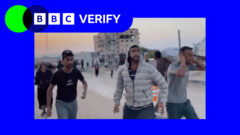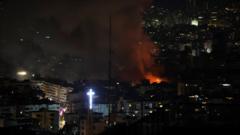Netanyahu acknowledges Israel's provision of arms to Gaza clans amid opposition accusations.
Netanyahu Confirms Arming Gaza Clans Opposed to Hamas

Netanyahu Confirms Arming Gaza Clans Opposed to Hamas
Israeli Prime Minister's controversial strategy may heighten security risks.
Israeli Prime Minister Benjamin Netanyahu has publicly affirmed that his government is providing arms to certain clans in Gaza that are reportedly opposed to Hamas, following reports regarding specific military authorizations. This revelation has stirred significant controversy, with critics asserting that such actions may jeopardize Israeli security.
Providing insight into the situation, Netanyahu defended his stance by stating, "What's wrong with this? It only saves the lives of Israeli soldiers." His remarks came in response to concerns raised after Israeli media disclosed that weapons, including Kalashnikov rifles seized from Hamas, were being supplied to a clan led by Yasser Abu Shabab, operating in Rafah. While the group presents itself as a counterforce to Hamas and claims its goal is to protect humanitarian aid convoys, there are allegations of illicit activities, including looting of aid shipments.
The United Nations has issued warnings about a potential famine affecting the majority of Gaza's population due to the dire lack of aid. Critics, including opposition leader Avigdor Lieberman, have denounced Netanyahu's decision, labeling the recipient group as criminal elements potentially linked to extremist factions like the Islamic State. Lieberman has argued that this move lacked proper cabinet approval and endangers national security.
While Yasser Abu Shabab denies receiving arms from Israel, asserting that his group's weaponry is antiquated and sourced locally, reports indicate tensions have escalated between Hamas and the Abu Shabab clan, with claims of targeted assassinations. In response to the escalating situation, Netanyahu's office maintains that these actions are part of a broader strategy to combat Hamas, adhering to suggestions from security experts.
However, prominent opposition voices, like Yair Golan, have condemned the move, warning it could lead to further volatility and insecurity in the region. Adding to the dire humanitarian crisis, the UN is calling for urgent investigations into ongoing violence in Gaza, where conditions have deteriorated drastically.
Providing insight into the situation, Netanyahu defended his stance by stating, "What's wrong with this? It only saves the lives of Israeli soldiers." His remarks came in response to concerns raised after Israeli media disclosed that weapons, including Kalashnikov rifles seized from Hamas, were being supplied to a clan led by Yasser Abu Shabab, operating in Rafah. While the group presents itself as a counterforce to Hamas and claims its goal is to protect humanitarian aid convoys, there are allegations of illicit activities, including looting of aid shipments.
The United Nations has issued warnings about a potential famine affecting the majority of Gaza's population due to the dire lack of aid. Critics, including opposition leader Avigdor Lieberman, have denounced Netanyahu's decision, labeling the recipient group as criminal elements potentially linked to extremist factions like the Islamic State. Lieberman has argued that this move lacked proper cabinet approval and endangers national security.
While Yasser Abu Shabab denies receiving arms from Israel, asserting that his group's weaponry is antiquated and sourced locally, reports indicate tensions have escalated between Hamas and the Abu Shabab clan, with claims of targeted assassinations. In response to the escalating situation, Netanyahu's office maintains that these actions are part of a broader strategy to combat Hamas, adhering to suggestions from security experts.
However, prominent opposition voices, like Yair Golan, have condemned the move, warning it could lead to further volatility and insecurity in the region. Adding to the dire humanitarian crisis, the UN is calling for urgent investigations into ongoing violence in Gaza, where conditions have deteriorated drastically.






















